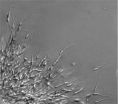(Press-News.org) A new finding in neuroscience for the first time points to a developmental mechanism linking the disease-causing mutation in an autism-related disorder, Timothy syndrome, and observed defects in brain wiring, according to a study led by scientist Ricardo Dolmetsch and published online yesterday in Nature Neuroscience. These findings may be at the heart of the mechanisms underlying intellectual disability and many other brain disorders.
The present study reveals that a mutation of the disease-causing gene throws a key process of neurodevelopment into reverse. That is, the mutation underlying Timothy syndrome causes shrinkage, rather than growth, of the wiring needed for the development of neural circuits that underlie cognition.
"In addition to the implications for autism, what's really exciting is that we now have a way to get at the core mechanisms tying genes and environmental influences to development and disease processes in the brain," said Dolmetsch, Senior Director of Molecular Networks at the Allen Institute for Brain Science.
"Imagine what we can learn if we do this hundreds and hundreds of times for many different human genetic variations in a large-scale, systematic way. That's what we are doing now at the Allen Institute," Dolmetsch continued.
In normal brain development, brain activity causes branches emanating from neural cells to stretch or expand. In cells with the mutation, these branched extensions, called dendrites, instead retract in response to neural activity, according to this study. This results in abnormal brain circuitry favoring connections with nearby neurons rather than farther-reaching connections. Further, the study identified a previously unknown mode of signaling to uncover the chemical pathway that causes the dendritic retraction.
This finding may have wide-reaching implications in neuroscience, as impaired dendrite formation is a common feature of many neurodevelopmental disorders. Further, the same gene has been implicated in other disorders including bipolar disorder and schizophrenia.
Under Dolmetsch's leadership, the Molecular Networks program at the Allen Institute, one of three major new initiatives announced by the Institute last March, is using similar methods on a grand scale. The Institute is probing a large number of human genetic variations and many pathways in the brain to untangle the cellular mechanisms of neurodevelopment and disease. In addition to identifying the molecular and environmental rules that shape how the brain is built, the program will create new research tools and data sets that it will share publicly with the global research community.
Timothy syndrome is a neurodevelopmental disorder associated with autism spectrum disorders and caused by a mutation in a single gene. In addition to autism, it is also characterized by cardiac arrhythmias, webbed fingers and toes, and hypoglycemia, and often leads to death in early childhood.
### The study was led by Ricardo Dolmetsch with colleagues at Stanford University.
Citation: Krey, JF et al. (2013) Timothy syndrome is associated with activity-dependent dendritic retraction in rodent and human neurons. Nature Neuroscience, advance online publication January 13, 2013.
About the Allen Institute for Brain Science
The Allen Institute for Brain Science (http://www.alleninstitute.org) is an independent nonprofit medical research organization dedicated to accelerating the understanding of how the human brain works in health and disease. Using a big science approach, the Allen Institute generates useful public resources used by researchers and organizations around the globe, drives technological and analytical advances, and discovers fundamental brain properties through integration of experiments, modeling and theory. Launched in 2003 with a seed contribution from founder and philanthropist Paul G. Allen, the Allen Institute is supported by a diversity of government, foundation and private funds to enable its projects. Given the Institute's achievements, Mr. Allen committed an additional $300 million in 2012 for the first four years of a ten-year plan to further propel and expand the Institute's scientific programs, bringing his total commitment to date to $500 million. The Allen Institute's data and tools are publicly available online at http://www.brain-map.org.
New discovery in autism-related disorder reveals key mechanism in brain development and disease
Findings published in Nature Neuroscience explain how Timothy syndrome mutation causes wiring defects associated with cognitive impairment
2013-01-14
ELSE PRESS RELEASES FROM THIS DATE:
Smoking, high blood pressure and cholesterol can be fatal for hemorrhage survivors
2013-01-14
"It is particularly important for subarachnoid haemorrhage survivors to refrain from smoking and to take care of their blood pressure and cholesterol levels; apart from age, these are the primary factors behind the increased risk of mortality," explains neurosurgeon Miikka Korja from the HUCH's Neurosurgery Department together with professor Jaakko Kaprio from the University of Helsinki's Hjelt Institute.
The most extensive population-based follow-up study ever carried out on the subject, jointly conducted by HUCH, the University of Helsinki, and the Finnish National ...
Depression after heart attack: Threat perception has to be addressed
2013-01-14
"Survivors of heart attacks are three times more likely to develop depression during the first six months after their heart attack, than people with no heart disease. If left untreated this contributes to a worse prognosis, for instance further cardiac events and possibly death. The causes for this high prevalence of depression after heart attacks are still unclear," said Prof. Claus Vögele, Professor of Clinical and Health Psychology at the University of Luxembourg and lead author of the publication entitled "Cardiac Threat Appraisal and Depression after First Myocardial ...
2 new studies show why biodiversity is important for pollination services in California almond
2013-01-14
Agricultural demand for pollination is growing more quickly than the supply of honey bees, the dominant species managed for crop pollination. Increasing the efficiency of pollination represents a way of increasing crop yield without any increase in agricultural intensity or area. A study recently published in the Proceedings of the Royal Society B: Biological Sciences (9 Jan 2013) 1, shows that the pollination effectiveness of honey bees in California almond orchards was greater in the presence of other bees.
Almond is a crop highly dependent on honey bee pollination ...
How does your garden glow?
2013-01-14
Nature's ability to create iridescent flowers has been recreated by mathematicians at The University of Nottingham. The team of researchers have collaborated with experimentalists at the University of Cambridge to create a mathematical model of a plant's petals to help us learn more about iridescence in flowering plants and the role it may play in attracting pollinators.
An iridescent surface appears to change colour as you alter the angle you view it from. It is found in the animal kingdom in insects, inside sea shells and in feathers, and is also seen in some plants. ...
How do happiness and sadness circuits contribute to bipolar disorder?
2013-01-14
Philadelphia, PA, January 14, 2013 – Bipolar disorder is a severe mood disorder characterized by unpredictable and dramatic mood swings between the highs of mania and lows of depression. These mood episodes occur among periods of 'normal mood', termed euthymia.
Prior research has clearly shown that brain emotion circuitry is dysregulated in individuals diagnosed with bipolar disorder. It is thought that these disturbances impair one's ability to control emotion and contribute to mood episodes.
Continuing this line of research, the January 15th issue of Biological Psychiatry ...
Global warming has increased monthly heat records by a factor of 5
2013-01-14
Monthly temperature extremes have become much more frequent, as measurements from around the world indicate. On average, there are now five times as many record-breaking hot months worldwide than could be expected without long-term global warming, shows a study now published in Climatic Change. In parts of Europe, Africa and southern Asia the number of monthly records has increased even by a factor of ten. 80 percent of observed monthly records would not have occurred without human influence on climate, concludes the authors-team of the Potsdam Institute for Climate Impact ...
Protein identified that can disrupt embryonic brain development and neuron migration
2013-01-14
Interneurons – nerve cells that function as 'dimmers' – play an important role in the brain. Their formation and migration to the cerebral cortex during the embryonic stage of development is crucial to normal brain functioning. Abnormal interneuron development and migration can eventually lead to a range of disorders and diseases, from epilepsy to Alzheimer's. New research by Dr. Eve Seuntjens and Dr. Veronique van den Berghe of the Department of Development and Regeneration (Danny Huylebroeck laboratory, Faculty of Medicine) at KU Leuven (University of Leuven) has identified ...
Research makes connetion between tubal ligation and increase in cervical cancer rates
2013-01-14
Women who have a tubal ligation – the surgical tying or severing of fallopian tubes to prohibit pregnancy – have less frequent Pap smears, which puts them at an increased risk for cervical cancer, according to research recently released by a team that included Cara A. Mathews, MD, a gynecologic oncologist at the Program in Women's Oncology at Women & Infants Hospital of Rhode Island.
The findings were part of the National Cancer Institute-funded study "Study to Understand Cervical Cancer Endpoints and Determinants" being conducted when Dr. Mathews was a fellow at the ...
Liver controls wasting in cancer
2013-01-14
Cachexia or wasting is a condition affecting up to 70 percent of cancer patients, depending on the type of cancer. It is characterized by a dramatic loss of body weight that is independent of food intake. Cachexia is seen particularly often and most pronounced in patients suffering from cancers of the digestive tract and the lungs. They may lose up to 80 percent of body fat and skeletal muscle. Muscle loss leads to weakness and immobility of patients and poorer response to treatment. An estimated 20 percent of cancer deaths are considered to be a direct consequence of cachexia, ...
Dynamic, dark energy in an accelerating universe
2013-01-14
This press release is available in Spanish.
It was cosmology that drew Irene Sendra from Valencia to the Basque Country. Cosmology alsogave her the chance to collaborate with one of the winners of the 2011 Nobel Prize for Physics on one of the darkest areas of the universe. And dark matter and dark energy, well-known precisely because so little is known about them, are in fact the object of the study bySendra, a researcher in the Department of Theoretical Physics and History of Science of the UPV/EHU's Faculty of Science and Technology.
"Observations tell us that ...
LAST 30 PRESS RELEASES:
How periodontitis-linked bacteria accelerate osteoporosis-like bone loss through the gut
Understanding how cells take up and use isolated ‘powerhouses’ to restore energy function
Ten-point plan to deliver climate education unveiled by experts
Team led by UC San Diego researchers selected for prestigious global cancer prize
Study: Reported crop yield gains from breeding may be overstated
Stem cells from human baby teeth show promise for treating cerebral palsy
Chimps’ love for crystals could help us understand our own ancestors’ fascination with these stones
Vaginal estrogen therapy not linked to cancer recurrence in survivors of endometrial cancer
How estrogen helps protect women from high blood pressure
Breaking the efficiency barrier: Researchers propose multi-stage solar system to harness the full spectrum
A new name, a new beginning: Building a green energy future together
From algorithms to atoms: How artificial intelligence is accelerating the discovery of next-generation energy materials
Loneliness linked to fear of embarrassment: teen research
New MOH–NUS Fellowship launched to strengthen everyday ethics in Singapore’s healthcare sector
Sungkyunkwan University researchers develop next-generation transparent electrode without rare metal indium
What's going on inside quantum computers?: New method simplifies process tomography
This ancient plant-eater had a twisted jaw and sideways-facing teeth
Jackdaw chicks listen to adults to learn about predators
Toxic algal bloom has taken a heavy toll on mental health
Beyond silicon: SKKU team presents Indium Selenide roadmap for ultra-low-power AI and quantum computing
Sugar comforts newborn babies during painful procedures
Pollen exposure linked to poorer exam results taken at the end of secondary school
7 hours 18 mins may be optimal sleep length for avoiding type 2 diabetes precursor
Around 6 deaths a year linked to clubbing in the UK
Children’s development set back years by Covid lockdowns, study reveals
Four decades of data give unique insight into the Sun’s inner life
Urban trees can absorb more CO₂ than cars emit during summer
Fund for Science and Technology awards $15 million to Scripps Oceanography
New NIH grant advances Lupus protein research
New farm-scale biochar system could cut agricultural emissions by 75 percent while removing carbon from the atmosphere
[Press-News.org] New discovery in autism-related disorder reveals key mechanism in brain development and diseaseFindings published in Nature Neuroscience explain how Timothy syndrome mutation causes wiring defects associated with cognitive impairment


